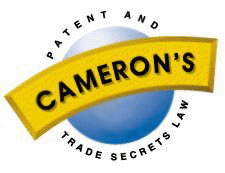
The King v.
Uhlemann Optical Company
citation(s): [1950] Ex. C.R. 142
 |
The King v.
|
copyright 1997 Donald M. Cameron, Aird & Berlis
"...The information as to the alleged invention given by the prior publication must, for the purposes of practical utility, be equal to that given by the subsequent patent. Whatever is essential to the invention or necessary or material for its practical working and real utility must be found substantially in the prior publication. It is not enough to prove that an apparatus described in it could have been used to produce a particular result. There must be clear directions so as to use it. Nor is it sufficient to show that it contained suggestions which, taken with other suggestions, might be shown to foreshadow the invention or important steps in it. There must be more than the nucleus of an idea, which in the light of subsequent experience, could be looked on as being the beginning of a new development. The whole invention must be shown to have been published with all the directions necessary to instruct the public how to put it into practice. It must be so presented to the public that no subsequent person could claim it as his own."
The King v. Uhlemann Optical Company [1950] 10 Fox Pat. C. 24 (per Thorson P.) At pp.38-39:
"... The requirements that must be met before an invention should be held to have been anticipated by a prior publication have been discussed in many cases and may be stated briefly. The information as to the alleged invention given by the prior publication must, for the purposes of practical utility, be equal to that given by the subsequent patent. Whatever is essential to the invention or necessary or material for its practical working and real utility must be found substantially in the prior publication. It is not enough to prove that an apparatus described in it could have been used to produce a particular result. There must be clear directions so to use it."
At p. 39:
"It must be kept in mind, of course, that in considering whether an invention was anticipated by a prior patent, the prior patent must be read in the light of the common knowledge which a person skilled in the art would have had immediately prior to the alleged invention".
Return to:
Cameron's IT Law: Home Page; Index
Cameron's Canadian Patent & Trade Secrets Law: Home Page; Index